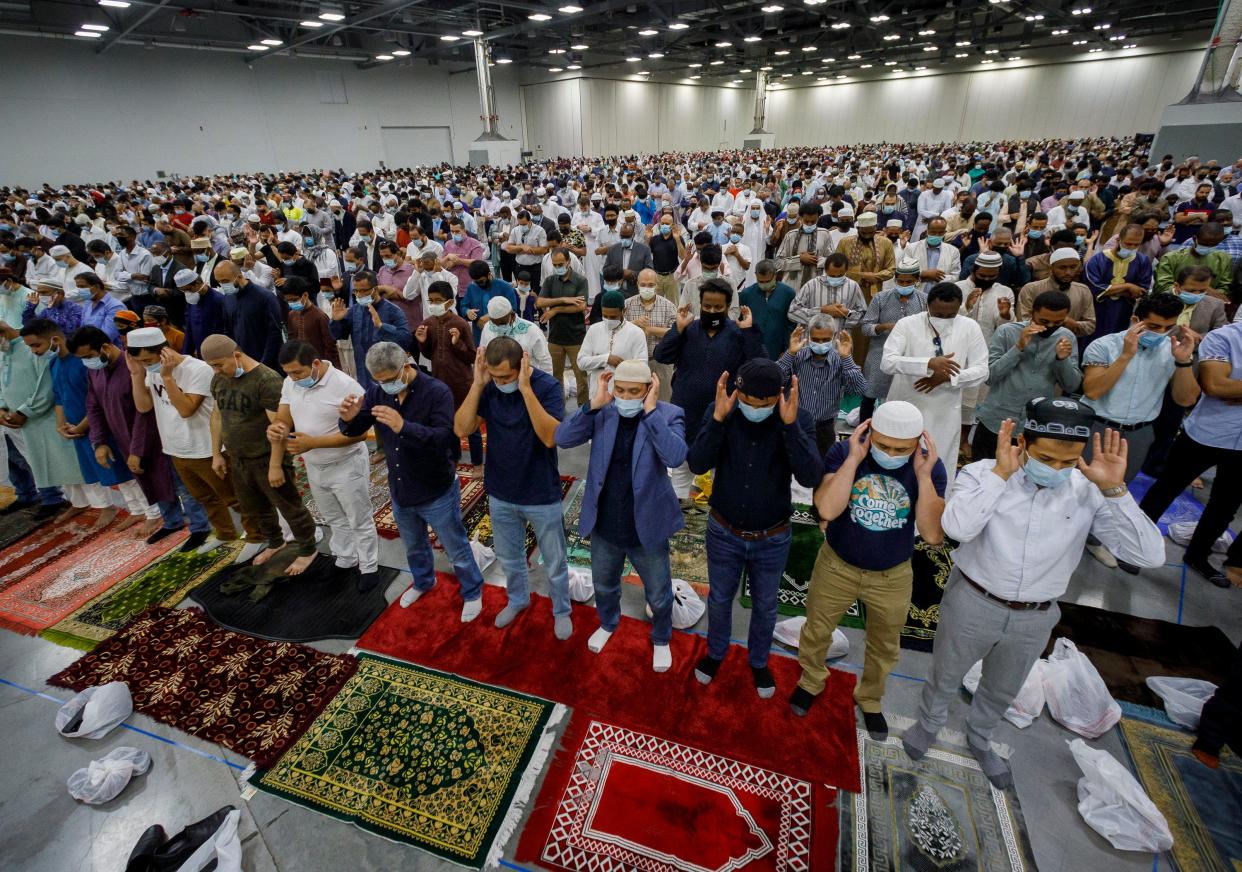Eid al-Adha: What you need to know about one of the most important Islamic holidays

On Saturday, Muslims in Columbus and throughout the world will celebrate Eid al-Adha, one of the two most important Islamic holidays of the year.
More than two dozen mosques in Greater Columbus will host special services over the weekend to commemorate the resolute faith of Abraham, or Ibrahim as he is known in the Muslim world. One mosque, the Abubakar Asiddiq Islamic Center in Columbus, is expecting up to 15,000 worshipers on Saturday, according to Imam Horsed Noah, outreach director of the Somali Islamic Centers of Ohio.
Eid al-Adha begins on the 10th day of the month of Dhu al-Hijjah, the last month of the Muslim calendar. Because the Muslim calendar is lunar, the timing of Eid al-Adha shifts relative to the Gregorian calendar each year.
Why do Muslims celebrate Eid al-Adha?
On the holiday, Muslims honor the faithfulness of Ibrahim — whom they consider the first in a line of prophets ending in Mohammed — after God tested him with a command to sacrifice his son Ismail (or Ishmael). Before Ibrahim could carry out the command, God, witnessing the extent of Ibrahim’s faith, provided a lamb (or ram) to be sacrificed instead.
Judaism and Christianity have a similar story in which it is Abraham’s other son, Isaac, who was to be sacrificed.
“Eid al-Adha is a time to revive the tradition of Prophet Ibrahim, who would sacrifice everything about his life to God — his time, his wealth, his energy,” Noah said.

Amina Barhumi, acting executive director of the Ohio chapter of the Council on American-Islamic Relations (CAIR), said Ibrahim’s faith can inspire people in their everyday lives.
“There’s so much trust you have to have in a higher being, and the wisdom of what’s happening, and having the strength to do your part,” she said.
Celebrations, prayer and almsgiving
During Eid al-Adha, Muslims worship at mosques and also celebrate together with family and friends, often feasting on mutton or beef.
Noah said that in his household, celebrations begin with singing the phrases “Allahu akbar” (God is great) and “Labaik allahuma labaik” (God, here I am responding to your call) with his children at home. The singing continues in the car as they drive to the mosque, wearing their best outfits. After the sermon and prayer, worshipers at the mosque hug each other take photographs with family and friends before heading off to share holiday meals together.
Charity is an important part of Eid al-Adha, just as it is in Islam as a whole. When customers visit butchers to buy meat for the holiday, they are expected to give one-third to the poor, one-third to extended family and friends, and keep one-third for themselves, according to Zerqa Abid, whose nonprofit My Project USA is coordinating food distributions ahead of the holiday.
Hassan Omar, president of the Somali Community Association of Ohio, said Eid al-Adha also is a time when many community members send money back to Somalia, where unemployment is high and the food supply is adversely affected by the war in Ukraine.
“Everyone has a family member back home who is waiting for some kind of gift from here,” he said.
Nicol Ghazi, director of the nonprofit Muslim Family Services of Ohio, said the holiday offers a chance to reflect and recharge.
“In this particular time, sacrifice is not far away from any of us. We’ve had lots of losses — major and minor — over the last several years,” she said.
How many Muslims live in Columbus?
The U.S. Census Bureau does not ask about religion, but a 2017 Pew Research Center study estimated that 3.45 million Muslims live in America, making up about 1% of the U.S. population as well as Ohio’s.
Some think that is an undercount. CAIR estimates Ohio is closer to 2% Muslim, with 100,000 Muslims in Greater Columbus.
Somali Americans make up the majority of Columbus’ Muslim population, but nationwide, Muslims are very ethnically diverse. About 28% of America’s Muslims are Black or African American, 23% are Asian, 14% are Arab and 19% are white, according to a 2019 survey by the Institute for Social Policy and Understanding. Half were born in the United States.
Peter Gill is a Report for America corps member and covers immigration issues for the Dispatch. Your donation to match our RFA grant helps keep him writing stories like this one. Please consider making a tax-deductible donation at https://bit.ly/3fNsGaZ
pgill@dispatch.com
This article originally appeared on The Columbus Dispatch: Eid al-Adha: Columbus Muslims celebrate Abraham's faith

